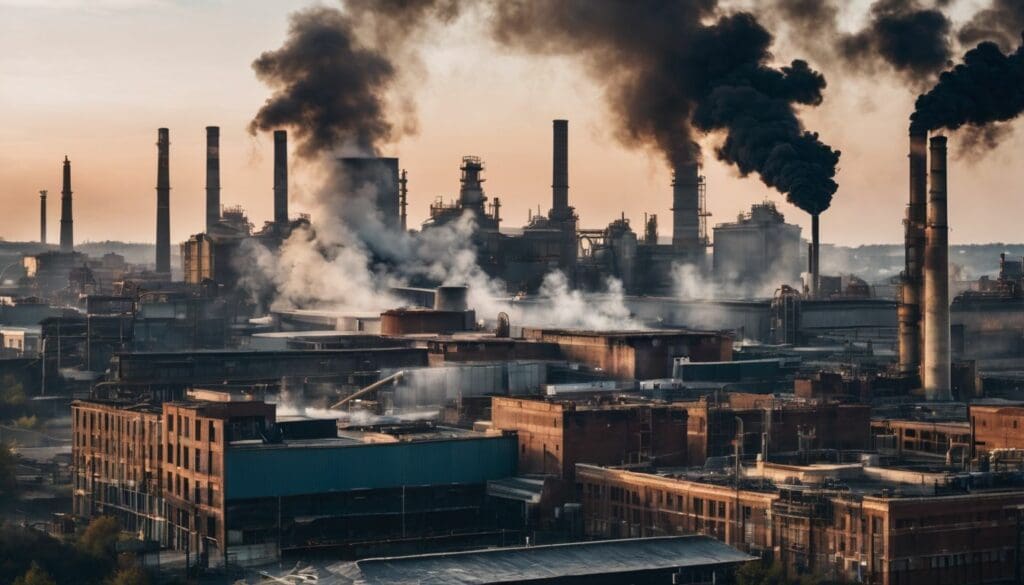Everyone’s talking about climate change, but who’s really to blame? Businesses are behind a staggering 71% of global emissions, making them major players in the climate crisis. This article will shine a light on what companies can do and are doing to turn the tide against environmental damage.
Keep reading – it’s time for change!
Key Takeaways
- Corporations are responsible for a large share of global emissions, with just 100 companies accountable for over 70% since 1988, emphasising the need for corporate responsibility.
- Companies can make a difference by investing in renewable energy, energy-efficient technologies and implementing sustainable supply chains to combat climate change.
- Business lobbying has significant influence on political decisions; therefore, companies should advocate for policies that support environmental sustainability instead of short-term gains.
- Collaboration between businesses, governments and NGOs is vital in creating impactful climate action initiatives like funding conservation projects or developing green technologies.
- Regulations and transparent corporate reporting are essential to ensure businesses are held accountable and making progress towards reducing their carbon footprint.
The Impact of Corporations on Climate Change
Corporations have a significant impact on climate change through their contribution to greenhouse gas emissions and lobbying efforts that influence political decisions. Debate continues between blaming consumers versus holding corporations accountable for their role in environmental degradation.
Blaming consumers vs. corporate responsibility
Finger-pointing at individuals for the climate crisis often overshadows a much larger issue: corporate accountability. While personal choices do matter, the environmental footprint of large companies far exceeds that of the average person.
Businesses have a massive impact on global climate change, with just 100 firms responsible for over 70% of greenhouse gas emissions since 1988. It’s clear that without significant changes in how these corporations operate, efforts to tackle climate change will be severely limited.
Leaders in business hold substantial power to drive positive change beyond what any single consumer can achieve. By setting ambitious environmental goals and investing in clean technologies like renewable energy and all-electric fleets, they can cut carbon emissions dramatically.
Rather than merely shifting blame onto consumers, it’s essential that we demand fossil fuel firms and other major polluters take full responsibility for their role in the environmental crisis.
This includes curbing not only their direct emissions but also those within their extensive supply chains and demanding lobbyists advocate for robust climate action rather than obstruct it.
Companies’ contribution to greenhouse gas emissions
Transitioning from the discussion on consumer blame versus corporate responsibility, it’s crucial to highlight companies’ significant contribution to greenhouse gas emissions. Corporations are responsible for a substantial portion of global emissions due to their large-scale operations, production processes, and supply chains.
Key contributors include manufacturing facilities, transportation fleets, and energy consumption in office spaces and retail outlets.
In addition to these direct sources of emissions, companies also indirectly contribute through activities such as deforestation for raw material sourcing and waste generation. Furthermore, the impact of multinational corporations extends beyond national borders, making it essential for businesses worldwide to address their environmental footprint.
Lobbying and influencing political decisions
Continuing from companies’ contribution to greenhouse gas emissions, it’s crucial to recognize the impact of lobbying and influencing political decisions on climate change policies.
Corporations often wield significant influence over government decision-making through advocacy efforts and financial contributions to political campaigns. This can lead to policies that prioritize short-term profits over long-term environmental sustainability.
Business leaders must be aware of the implications of their lobbying activities and take responsibility for advocating for policies in line with sustainable practices. It is essential for environmentally conscious individuals to stay informed about corporate lobbying efforts and advocate for transparent, environmentally responsible policymaking.
The Role of Businesses in Addressing Climate Change
Business leaders have the opportunity to invest in sustainable practices and reduce their carbon footprint through initiatives such as charging infrastructure for electric vehicles and transitioning to all-electric fleets.
Collaboration with governments and NGOs is also crucial in addressing climate change on a corporate level.
Investing in sustainable practices
- Implementing renewable energy sources, such as solar and wind power, to reduce reliance on fossil fuels.
- Introducing energy – efficient technologies and processes to minimise environmental impact.
- Adopting sustainable supply chain management, ensuring products are sourced and manufactured ethically and sustainably.
- Engaging in reforestation efforts or supporting conservation projects to offset carbon emissions.
Reducing carbon footprint
- Implementing energy-efficient practices throughout operations, such as installing LED lighting and using energy-saving equipment.
- Embracing renewable energy sources like solar or wind power to reduce reliance on fossil fuels.
- Encouraging telecommuting and flexible work arrangements to minimise commuting-related emissions.
- Optimising transportation by transitioning to all – electric fleets or promoting carpooling among employees.
- Adopting sustainable packaging materials and reducing unnecessary waste in production processes.
Collaborating with governments and NGOs
Businesses actively collaborate with governments and NGOs to drive impactful change in climate action:
- Advocating for policy changes and regulations that support sustainable practices and emissions reduction.
- Partnering with environmental organisations and governmental bodies to fund and implement conservation initiatives, renewable energy projects, and reforestation efforts.
- Engaging in public – private partnerships to develop innovative solutions for reducing environmental impact.
- Participating in industry – wide coalitions to collectively address climate challenges through knowledge sharing, research, and resource mobilisation.
The Need for Accountability and Transparency
Government regulations are essential to hold corporations accountable for their environmental impact, and corporate reporting plays a crucial role in ensuring transparency. Want to learn more about how businesses can address climate change? Keep reading!
The role of regulations
Regulations play a crucial role in holding corporations accountable for their environmental impact. They set clear guidelines and standards that companies must adhere to, ensuring that they operate in an environmentally responsible manner.
Regulations also provide frameworks for monitoring and enforcing sustainable practices, thus preventing greenwashing and promoting genuine corporate responsibility initiatives.
Additionally, regulations can incentivise businesses to invest in eco-friendly technologies and practices by offering tax breaks or other incentives for reducing their carbon footprint.
The importance of corporate reporting
Corporate reporting plays a vital role in holding businesses accountable for their impact on the environment. By disclosing their carbon emissions, energy consumption, and sustainability efforts, companies can transparently showcase their commitment to addressing climate change.
This information empowers stakeholders and consumers to make informed decisions, supporting environmentally responsible businesses and incentivising others to follow suit. Furthermore, corporate reporting fosters trust and credibility, allowing companies to demonstrate their progress towards environmental goals and build a reputation as leaders in corporate social responsibility.
Transparent corporate reporting also enables comparisons between different businesses’ environmental performance. It provides valuable insights for investors, policymakers, and the public in understanding which companies are actively working towards reducing their carbon footprint and embracing sustainable practices.
Conclusion: The Future of Corporate Responsibility for Climate Change Reduction
In the future, businesses will need to take greater responsibility for reducing their impact on climate change. They must invest in sustainable practices and reduce their carbon footprint.
Collaboration with governments and NGOs is crucial to drive meaningful change. Regulations and corporate reporting will play a key role in holding businesses accountable for their environmental impact.
The future of corporate responsibility for climate change reduction rests on proactive action and transparency from business leaders.
FAQs
1. What role do corporations play in climate change?
Corporations significantly impact climate change through their production processes and operational activities, which often result in large carbon emissions.
2. Can business leaders influence the fight against climate change?
Yes, business leaders can make a big difference by setting eco-friendly policies and encouraging individual contributions to create positive changes for the environment.
3. How important are corporate actions compared to individual efforts in addressing climate change?
Corporate actions are crucial because they can lead to substantial changes on a larger scale, whereas individual contributions, though important, cumulatively add up over time.
4. Are there specific steps companies can take to reduce their carbon footprint?
Companies could start by transitioning to all-electric fleets for transportation needs and adopting more sustainable practices across their supply chains to lessen environmental impact.



